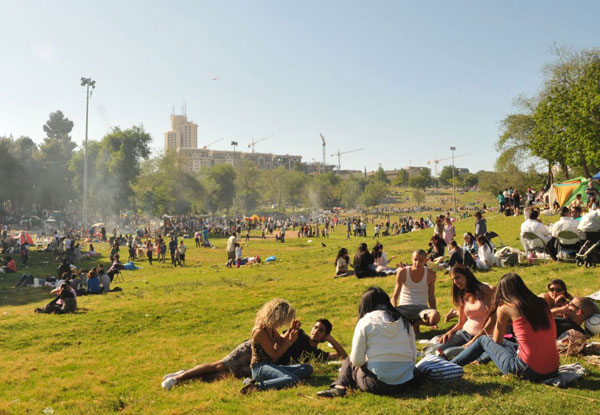Australia/Israel Review
The Last Word: The Palestinian Haters
Jan 29, 2014 | Jeremy Jones

Jeremy Jones
Jerusalem is a very special city.
Of great religious importance, it is often falsely represented as simply a fulcrum of conflict rather than as an inspirational source of compassion, wisdom and understanding.
It figures in the historic memory of a number of civilisations and cultures, but the episodes of conflict can overshadow the reality of a living, sometimes vibrant, sometimes less so, community of communities.
When I mentioned to some acquaintances recently that I was heading for Jerusalem, the immediate, media-founded reaction was to sympathise with me for having to travel to a violent and unpleasant environment.
When walking through Sacher Park on Shabbat afternoon, the disconnect between that image and the reality came into sharp focus.
In one part of the park, a group was playing cricket, with the boundaries marked by groups of Muslim, Christian and Jewish families having picnics in the sun.
Children were kicking footballs in family groups; joggers of all shapes, sizes, colours and creeds pounded the dedicated track and parts of the parkland; an inconsiderate cyclist was rebuked in Arabic, Hebrew, Tagalog, Amharic, English and other languages; and puppies out for walks drew clusters of happy children from many backgrounds.
On one basketball court, a middle-aged man wearing a white shirt, black trousers and a large velvet kippah, and his similarly attired son, were shooting hoops together with two Arab Muslim teenage girls, a group of young boys and a young woman in the uniform of an Israeli youth group.
The day earlier, I met two Muslim sisters who identify unambiguously as Palestinian, doing something they told me was quite unexceptional – eating kosher shwarma and shopping for sale items in a mall.
Jerusalem is far from a unique in this sense – two days later I walked from Tel Aviv into Jaffa seaport, and saw many mixed groups sitting together enjoying the sunshine by the sea, saw children from different groups playing and spoke to tourists from Japan, Philippines, South Korea and the USA, who all said that the reality they encountered in Israel was so different from their expectations, and so much better.
Israel does indeed have serious social problems, is marked by vigorous debate and features political, religious and cultural polarisation.
Further, no rational Israeli is unaware of the difficult lives of many who live in areas administered by the Palestinian authorities and the issues which will fester until the status of people and land is finally determined.
There is an awareness, however, that so much criticism directed at their country is not based on true compassion or even genuine concern for Palestinians or sincere dreams of peace.
The vitriol, the fuelling of ridiculous expectations and, most importantly, the bullying of any Arab or Muslim who talks of cooperation, conciliation and understanding, reeks more of contempt than compassion for the people allegedly being championed.
In fact, it often seems that many so-called pro-Palestinians in the west actually hate Palestinians, and cynically extend the time before the Palestinians can escape their difficult current circumstances.
The seemingly deliberate lack of understanding of the structure of Palestinian society, the economic possibilities, the human rights situation, corruption and other matters helps to entrench individuals and movements who put self-interest ahead of the needs and aspirations of the people they claim to support.
It is not difficult to find those within the growing Christian population in Israel, so conscious of the travails of ancient communities of co-religionists across the region, who privately express anger at the self-serving, ego-driven foreign propagandists who proclaim their Christianity, as if that protects them from intellectual ridicule and justified charges of hypocrisy.
Those genuinely concerned with human rights, peace and a better future for the peoples in the region would help promote an environment where privately expressed thoughts could be made in public, without fear of intimidation, harassment or worse.
The way the self-declared advocates for Palestinians behave in Australia at present, however, gives little cause for optimism.
Tags: Israel






